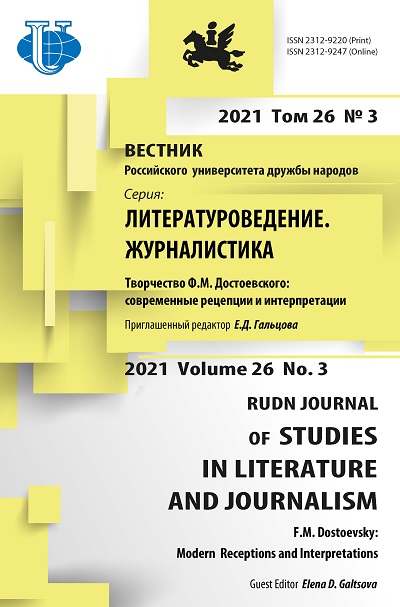Oblomov and Myshkin: Some Aspects of the Issue
- Authors: Belyaeva I.A.1,2
-
Affiliations:
- Moscow City University
- Lomonosov Moscow State University
- Issue: Vol 26, No 3 (2021): F.M. DOSTOEVSKY: MODERN RECEPTIONS AND INTERPRETATIONS
- Pages: 457-465
- Section: LITERARY CRITICISM
- URL: https://journals.rudn.ru/literary-criticism/article/view/27647
- DOI: https://doi.org/10.22363/2312-9220-2021-26-3-457-465
- ID: 27647
Cite item
Full Text
Abstract
The article examines one of the possible parallels between the protagonists of the novels Oblomov and The Idiot , which was formulated by Dostoevsky himself. He pointed out both the similarities between Myshkin and Oblomov and the differences between the two. The purpose of the article is to explain the special status of the characters of Dostoevsky and Goncharov, which is linked to their explicit or implicit desire to save the world. The task is to systematize various views of scholars on the issue of Dostoevsky and Goncharov, especially in the light of their relation to the Russian spiritual tradition. The thesis is put forward that the similarity between the two protagonists may be explained by the similarity of the two authors’ views on the problem of secular holiness. In both novels similar versions of the “plot of salvation” are realized, in which the protagonist claims to be the savior of others, although another motif, that of personal salvation, is emphasized by Goncharov in Oblomov and has Dante origins. While in the case of Myshkin his wish to be Christ-alike lead him to a personal catastrophe, and the destruction of his inner circle, in Oblomov’s case there are no such losses, there are even some advantages in the form of the emerging life of Shtolz and Olga, in the form of awakening to a new life of Agafia Matveevna Pshenitsyna. The author of the article comes to the conclusion that both Dostoevsky and Goncharov did not forget about the human nature of their characters, but the former, as Goncharov put it, allowed his Myshkin, “Prince Christ”, to wear a “divine robe” and thus largely predetermined his failure as a savior, while the latter alleviated the traits of holiness in his Oblomov, leaving only traces of them, which attract people to the character making them and their small world better.
Keywords
About the authors
Irina A. Belyaeva
Moscow City University; Lomonosov Moscow State University
Author for correspondence.
Email: belyaeva-i@mail.ru
ORCID iD: 0000-0003-2840-4034
Doctor of Philology, Professor of Russian Literature Department of Moscow City University, Professor of History of Russian Literature Department of Philological Faculty at Lomonosov Moscow State University
4 2-Sel’skohos’ajstvennyi Pas., Moscow, 129226, Russian Federation; Leninskije Gory, GSP, Moscow, 119991, Russian FederationReferences
- Bityugova, I.A. (1976). I.A. Goncharov’s Oblomov in the perception of Dostoevsky. In Dostoevsky. Materials and research (Vol. 2, pp. 191–198). Leningrad: Nauka Publishing House. (In Russ.)
- Ornatskaya, T.I. (1992). Dostoevskij and Goncharov. In Goncharov I.A.: Materials of the 1987 jubilee Goncharov conference (pp. 105–114). Ulyanovsk: Simbirsk book Publishing House. (In Russ.)
- Tunimanov, V.A. (2003). “Pathetic words” (Oblomov by Goncharov and Notes from Underground by Dostoevsky). In Pro memoria (pp. 168–178). Saint Petersburg: Nauka Publishing House. (In Russ.)
- Trofimova‑Shiff, T.B. (2019). “..And they made him write notes” (on the topic “F.M. Dostoevsky and I.A. Goncharov”). In Dostoevsky. Materials and research (Vol. 22, pp. 208–217). Saint Petersburg: Nestor‑History Publishing House. (In Russ.)
- Mel’nik, V.I. (2010). I.A. Goncharov and F.M. Dostoevskij. Bulletin of Slavic Cultures, 1(15), 51–63. (In Russ.)
- Blank, K. (2001). Myshkin and Oblomov. In F.M. Dostoevsky’s novel “The Idiot”: the current state of research (pp. 472‑481). Moscow, Heritage Publishing House. (In Russ.)
- Halacinska-Vertelyak, H. (1991). Dream Hypostases: Don Quixote – Oblomov – Myshkin. In Internationale Fachkonferenz “Ivan A. Gončarov: Leben, Werk und Wirkung” (p. 10). Thesenpapiere. Bamberg. (In Russ.)
- F.M. Dostoevsky in the memoirs of a typographer, 1872–1881. (1892). Russian antiquity (5), 293–336. (In Russ.)
- Dostoevskij, F.M. (1985). Complete works (Vol. 28, book 2). Leningrad: Nauka Publishing House. (In Russ.)
- Belyaeva, I.A. (2016). The plot of salvation in the Russian classic novel. In Philological sciences. Scientific reports of higher education, (6), 44‑52. (In Russ.)
- Belyaeva, I.A. (2017). Oblomov’s plan for a new life, and a new life of Olga and Stolz. In Materials of VIth International scientific conference dedicated to the 205th anniversary of the birth of I.A. Goncharov (pp. 76–84). Ulyanovsk: Publishing House “Corporation of Promotion Technologies”. (In Russ.)
- Stepanyan, K.A. (2010). Phenomenon and dialogue in the novels of F.M. Dostoevsky. Saint Petersburg: Kriga Publishing House. (In Russ.)
- Dostoevskij, F.M. (1973). Complete works (Vol. 8). Leningrad: Nauka Publishing House. (In Russ.)
- Arsent’eva, N.N. (1996). The problem of the national ideal in the works of M. de Cervantes and F.M. Dostoevsky. In F.M. Dostoevsky and national culture (Vol. 2, pp. 65–88). Chelyabinsk: Chelyabinsk State University Publishing House. (In Russ.)
- Mel’nik, V.I. (2012). Goncharov. Moscow: Veche Publishing House. (In Russ.)
- Goncharov, I.A. (1998). Complete works and letters (Vol. 4). Saint Petersburg: Nauka Publishing House. (In Russ.)
- Goncharov, I.A. (1955). Collected works (Vol. 8). Moscow: State Publishing House of Fiction (In Russ.)
Supplementary files















